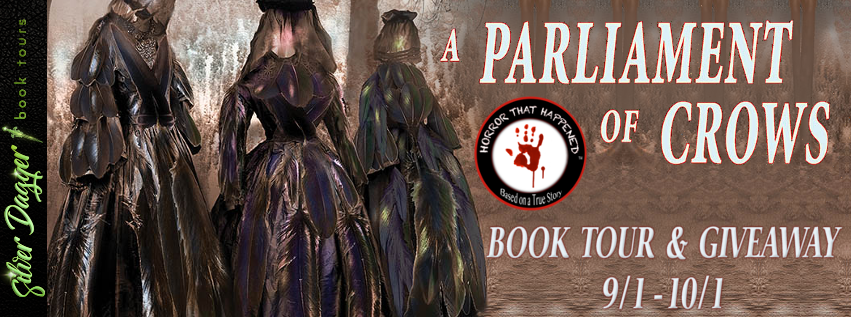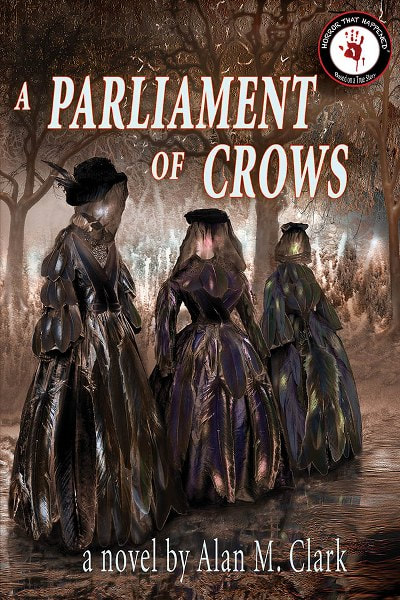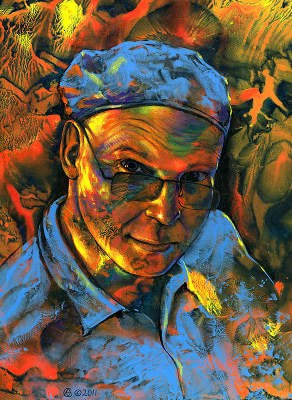A Parliament of Crows by Alan M. Clark Book Tour and Giveaway :)
A
Parliament of Crows
by
Alan M. Clark
Genre:
Southern Gothic Crime, Horror
In
A Parliament of Crows, the three Mortlow sisters are prominent
American educators of the nineteenth century, considered authorities
in teaching social graces to young women. They also pursue a career
of fraud and murder. Their loyalty to one another and their need to
keep their secrets is a bond that tightens with each crime, forcing
them closer together and isolating them from the outside world. Their
ever tightening triangle suffers from madness, religious zealotry and
a sense of duty warped by trauma they experienced as teenagers in
Georgia during Sherman's March to the Sea. As their crimes come back
to haunt them and a long history of resentments toward each other
boils to the surface, their bond of loyalty begins to fray. Will duty
to family hold or will they turn on each other like ravening crows?
Chapter 1: Vertiline—Loss of Life
Newark, New Jersey 1908
The shame of Vertiline’s incarceration had abated little in the eighteen months since her arrest. Believing herself nearly helpless against the forces controlling her fate, she expressed the slight power that remained to her in a simple reminder spoken aloud each morning while sitting on the bunk in her jail cell: “After what they did during the war, they have no right to judge us. Maintain a sense of personal dignity, for you are useless to your sisters without it.” The state of New Jersey had indicted jointly Miss Vertiline Mortlow, sixty-one years of age, and her fifty-nine-year-old twin sisters, Mrs. Mary Mortlow Sneed, and Mrs. Carolee Mortlow Marshall. They were charged them with insurance fraud and the murder of Carolee’s daughter, Orphia Marshall Sneed. The young woman had been found dead in the bathtub of the sisters’ East Orange apartment, lying in a few inches of cold water, her head below the faucet, and her feet hanging over the back of the tub. Although suspicious, her death was at first seen as suicide. When Vertiline and her sisters tried to collect on several insurance policies they had taken out on Orphia, the police began an investigation and the sisters were arrested. In the long delay before the trial, during which the sisters were kept in separate jail cells, the twins had perhaps suffered the most. Based on what her attorney said of his visits with them, Vertiline feared that Mary intentionally starved herself and that Carolee had gone mad from the isolation. As the time drew near for the sisters to appear in court, Vertiline felt an unaccountable excitement despite her dread. After endless days of boredom spent in her lonely cell, she anticipated that the trial would provide intellectual and emotional stimulation. She hated herself for looking forward to the event. On the first day of trial—the first time she’d seen the twins in over a month—while riding in the police van to the courthouse, Vertiline tried to make eye contact with her sisters. Carolee’s eyes darted about warily. When spoken to, she appeared startled, even frightened at times. Mary, her eyes downcast, was emaciated and uncommunicative. She flinched and cringed whenever Carolee became agitated. “Are you well?” Vertiline asked them several times in different ways and with increasing urgency. Their answers held little information. As the trial commenced in the courtroom with the prosecution presenting its case, Vertiline struggled to put her fears aside and look for ways to aid in her own defense. Torn between the urgency of concern for her sisters, and the need to maintain awareness of the proceedings, her head ached, her heart beat uncomfortably in her chest, and she struggled to take deep breaths. In defense of her own sanity, her mind turned briefly to pleasant recollection.
~ ~ ~
Vertiline had spent a childhood of privilege in a home on Spring Street in Milledgeville, Georgia. Having recalled innumerable times the magical summer parties her mother, Abigale Sobearn Mortlow, hosted in the garden behind the house, Vertiline easily found vivid memories of the events within her mind. She could see the beautiful guests, their eyes cheerful, movements graceful and gracious, their clothing exquisite. She heard their happy voices, full of charm and wit. The exotic decorations and extravagant tables of food and drink were there, filled with dishes prepared from Ducy's delicious recipes by the cook. Vertiline could almost taste the buttered spoonbread, the fried fish, and chess pie. As dusk approached amidst the gentle murmur of the guests, Abigale move about, a silent white bell in her crinoline, lighting colorful Chinese paper lanterns strung on cane poles. Lightning bugs rose from the warm earth of the flower beds, their soft greenish yellow glow competing with the warm flickering orange flames within the lanterns. Bitter-sweet, the magic light inevitably faded from the garden with the memory of loosing Abigale to pneumonia brought on by influenza. Vertiline had been seven years old when her mother died. For all the crisp memories of the garden parties, her recollections of Abigale had wilted, her lovely features having faded from memory. Thankfully, the warmth and love of her father, Georgia Supreme Court Justice Horace G. Mortlow, always remained in full bloom. Though he had long ago passed away, her memories of him were clear. He was truly the only authority to whom she must answer. Surely, he would understand what she and her sisters had done and why, and would not judge them too harshly.
~ ~ ~
Her breath more even, her heart calmed somewhat, Vertiline’s awareness returned to the courtroom. The judge, a tall, lean man with a bushy brow named Tolland, spoke from the bench to Mary, “Mrs. Sneed, please sit upright and show the court due respect.” Vertiline wanted to say that her sister wasn’t a child to be reprimanded for her behavior, but held her tongue. Within moments, Mary had slumped forward in her chair again. Judge Tolland seemed to notice, but said nothing until her head fell forward, lolling upon the table. Then discussions began concerning the poor condition of Mrs. Mary Mortlow Sneed, and Judge Tolland adjourned the trial for the day. To stave off despair, Vertiline tried to believe in what her father had always called “the hope of tomorrow.”
Alan
M. Clark grew up in Tennessee in a house full of bones and old
medical books. As a writer and illustrator, he is the author of
sixteen published books, including 11 novels, a lavishly illustrated
novella, four collections of fiction, and a nonfiction full-color
book of his artwork. His illustrations have appeared in books of
fiction, non-fiction, textbooks, young adult fiction and children's
books. Awards for his work include the World Fantasy Award and four
Chesley Awards. Mr. Clark's company, IFD Publishing, has released 42
titles of various editions, including traditional books, both
paperback and hardcover, audio books, and ebooks by such authors as
F. Paul Wilson, Elizabeth Engstrom, and Jeremy Robert Johnson.
What is your favorite part of this book and why?
I don’t really do favorites, but I particularly
enjoyed Carolee’s flight from the sisters’ lodgings in Brooklyn to escape
Mary’s grief over the loss of an infant. Carolee’s trek is something of an
odyssey through dangerous 19th century New York streets at night. She knows she
should be frightened, but then realizes that, based on her crimes, she,
herself, is more dangerous than most of those she sees in the night. She is
much more concerned with severing her connection to her sister’s grief so that
she doesn’t have to “feel” it anymore.
Are your characters based off real people or did
they all come entirely from your imagination?
The answer is that both are true. When writing
fiction based on history, we know the highlights of what happened with a
character, as often their most interesting deeds are recorded. We frequently
don’t know what emotionally motivated the person. That’s part of the mystery
that gets me interested in writing a tale from history. I have to give the
character experiences that help form their motivations, and demonstrate their
decisions and choices through scenes involving their actions and dialoque.
Do the characters all come to you at the same time
or do some of them come to you as you write?
Most of my characters’ emotional development comes
while I’m in the process of writing.
What kind of research do you do before you begin
writing a book?
Mostly, I start a project, putting words on the
page, then research what I need to along the way.
Do you write one book at a time or do you have
several going at a time?
One story at a time, generally.
Pen or type writer or computer?
Computer word processing
Advice you would give new authors?
Same advice I give artists and illustrators—be
tenacious in pursuing your dream.
What makes a good story?
Well developed characters facing conflict that test
them and brings out emotional qualities not forseen.
Follow
the tour HERE
for exclusive excerpts, guest posts and a giveaway!










Comments
Post a Comment